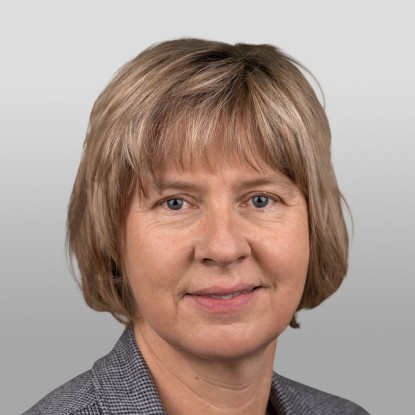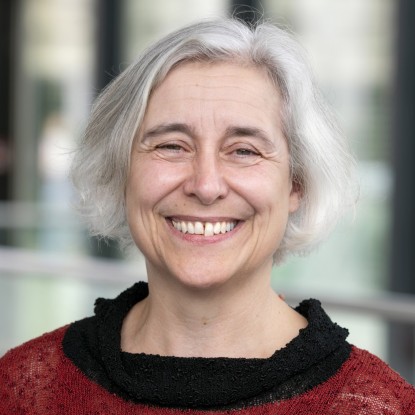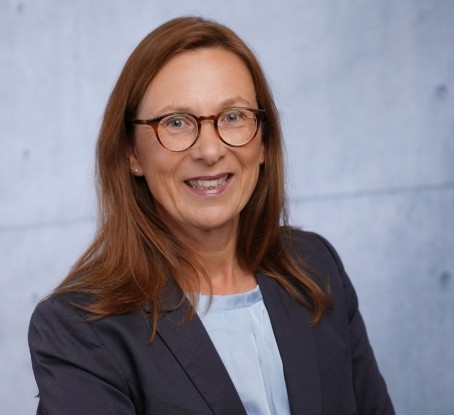Tuesday, October 16, 2018, 15:15 – 16:15, Room S2|15 401
Speaker: Jolanta Marzec (TU Darmstadt)
Abstract: Fourier coefficients of Siegel modular forms have played a prominent role in number theory. For example, in case of classical modular forms (degree $n=1$), the coefficients are equal to Hecke eigenvalues and are linked to a number of rational points on suitable elliptic curves. In the case of Siegel modular forms of degree $2$ they carry information about certain central critical values of quadratic twists of associated spinor $L$-functions (B\"ocherer's conjecture). Of special importance are \emph{fundamental Fourier coefficients}: their non-vanishing is related to existence of `nice' models for the associated global automorphic representations, and consequently enabled to prove analytic and algebraic properties for $L$-functions for $\mathrm{GSp}_4\times\mathrm{GL}_2$.
Even though a lot of work has been devoted to Siegel modular forms of degree $2$, their Fourier coefficients – especially in case of non-trivial level – lack good understanding. Therefore, motivated by the properties described above and the problem of determination of Siegel modular forms by an interesting subset of Fourier coefficients, we derive relations between `simple' and `more complicated' Fourier coefficients, and indicate their applications.
Thursday, October 25, 2018, 15:20 – 17:00, Room S2|15 244
Speaker: Toshiki Matsusaka (Kyushu University / Universität zu Köln)
Abstract: In 2011 Duke-Imamoglu-Toth showed the generating functions of traces of cycle integrals and CM values of modular functions are (poly)harmonic Maass forms. I give a generalization of their work to polyharmonic Maass forms.
Tuesday, October 30, 2018, 15:15 – 16:15, Room S2|15 401
Speaker: Christian Elsholtz (TU Graz)
Abstract: Apart from the ancient sieve of Eratosthenes, modern sieve theory started in 1915, when Viggo Brun showed that there are not too many twin primes, so that the sum of reciprocals 1/5+1/7+1/11+1/13 +1/17+1/19+… is finite, or convergent. In fact, it can be proved that for any fixed (a_1, …, a_k) the number of k-tuples of primes (n+a_1,n+a_2,…, n+a_k) with n <x is at most C_{k,a_1,…,a_k} x/(log x)^k. Using the large sieve, one can analyze what happens, when k is not a constant. If for example k=log x, one can give the following upper bound for the number of such tuples: O(x/exp( log x log log log x/log log x)). When k is (log x)2, onbe gets the dramatically better bound O(x^(2/3)), and when k increases this approaches x^(1/2). From this one can conclude that the set of primes cannot be written as a sumset P=A+B+C, even if one allows finitely many mistakes. In this talk we give a survey of such upper bounds for the prime k-tuple problem in its full range, from very small k to very large k.
Tuesday, November 27, 2018, 14:00 – 15:00, Room S2|15 401
Speaker: Andreea Mocanu (University of Nottingham)
Abstract: I will give a brief introduction to Jacobi forms, including some examples and their relation to other types of modular forms. After that, I will discuss some of the ingredients that go into developing a theory of newforms for Jacobi forms of lattice index, namely Hecke operators, level raising operators and orthogonal groups of discriminant modules.
Tuesday, December 18, 2018, 15:15 – 16:15, Room S2|15 401
Speaker: Haowu Wang (Université Lille)
Abstract: Reflective modular forms are holomorphic functions whose divisors are determined by rational quadratic divisors associated to reflective vectors. This type of modular forms has applications in arithmetic, geometry and Lie algebra. The classification of reflective modular forms is an old open problem and has been investigated by several mathematicians. In this talk, I introduce an approach based on the theory of Jacobi forms to classify reflective modular forms on lattices of general level. I give an explicit formula to express the weight of reflective modular forms. I also prove two non-existence results. The first one is that there is no lattice of signature (2, n) having a 2-reflective modular form when n > 14 with three exceptions. The second is that there is no lattice of signature (2, n) admitting a reflective modular form when n >22 except the unimodular lattice of signature (2,26).
Tuesday, January 8, 2019, 15:15 – 16:15, Room S2|15 401
Speaker: Jolanta Marzec (TU Darmstadt)
Abstract: How to associate an automorphic representation of GSp(2n) to a Siegel modular form of degree n. Tomorrow we will focus on spherical representations.
Friday, January 11, 2019, 14:15 -15:15, Room S2|15 401
Speaker: Eyal Goren (McGill University)
Abstract: Let p and q be distinct primes. In a joint work with Payman Kassaei (King’s College) we are studying questions concerning the dynamics of the Hecke operator T_q in its action on the modular curves X_1(N), where (N, pq) = 1, in the p-adic topology. Using Serre-Tate coordinates and isogeny volcanoes for points of X_1(N) with ordinary reduction, and using the graphs of supersingular elliptic curves and the Gross-Hopkins period map for points with supersingular reduction, we are able to get rather precise understanding of orbits of points. If time allows, I will also discuss the work of Herrero, Menares and Rivera-Letelier that is complementary to ours.
Monday, March 11, 2019, 15:15 – 16:15, Room S2|15 401
Speaker: Jolanta Marzec (TU Darmstadt)
Abstract: Part III: We continue studying an automorphic representation associated to a Siegel modular form of degree n. This time we will construct a component at the archimedean place.
Tuesday, April 23, 2019, 15:15 – 16:15, Room S2|15 401
Speaker: Robert Osburn (University College Dublin)
Abstract: Over the past two decades, there has been substantial interest in the overlap between quantum knot invariants, q-series and modular forms. In this talk, we discuss one such instance, namely an explicit q-hypergeometric expression for the colored Jones polynomial for double twist knots. As an application, we generalize a duality at roots of unity between the Kontsevich-Zagier series and the generating function for strongly unimodal sequences. This is joint work with Jeremy Lovejoy (Paris 7 and Berkeley).
Tuesday, May 14, 2019, 15:15 – 16:15, Room S2|15 401
Speaker: Dimitri Wyss (Université Paris 6)
Abstract: Based on mirror symmetry considerations, Hausel and Thaddeus conjectured an equality between 'stringy' Hodge numbers for moduli spaces of SL_n/PGL_n Higgs bundles. We prove this conjecture using non-archimedean integration in the sense of Denef-Loeser and Batyrev and the duality of generic Hitchin fibers.
In a more arithmetic context, similar ideas lead to a new proof of the geometric stabilization theorem for anisotropic Hitchin fibers, a key ingredient in the proof of the fundamental lemma by Ngô. This is joint work with Michael Groechenig and Paul Ziegler.
Tuesday, May 21, 2019, 15:15 – 16:15, Room S2|15 401
Speaker: Mark Feldmann (Universität Münster)
Abstract: We study Weil group representations over the coefficient feld Qp and establish certain equivalences of categories in the flavor of Fontaine's classification of p-adic representations of the absolute Galois group. If we restrict to crystalline (or de-Rham) Weil group representations, we can describe the category of these Weil group representations in terms of generators. More precisely it is generated as an abelian tensor category by the full subcategory of Galois group representations and finite unramified inductions of the character Qp(| · |) given by Artin's reciprocity law.
Tuesday, June 25, 2019, 15:15 – 16:15, Room S2|15 401
Speaker: Andrew Corbett (University Exeter, UK)
Abstract: The information buried in the Fourier coefficients of automorphic forms is not often readily accessible; that is part of their endear. We tackle a selection of problems in number theory whose solution is related a careful understanding of such Fourier coefficients at different cusps. We bring forth a p-adic framework which may be utilised in the various problems.
Tuesday, July 2, 2019, 15:15 – 16:15, Room S2|15 401
Speaker: Kęstutis Česnavičius (Université Paris-Sud, Orsay)
Abstract: For regular Noetherian schemes, the cohomological Brauer group is insensitive to removing a closed subscheme of codimension \ge 2. I will discuss the corresponding statement for schemes with local complete intersection singularities, for instance, for complete intersections in projective space. Such purity phenomena turn out to be low cohomological degree cases of purity for flat cohomology. I will discuss the latter from the point of view of the perfectoid approach to such questions. The talk is based on joint work with Peter Scholze.
Tuesday, July 9, 2019, 15:15 – 16:15, Room S2|15 401
Speaker: Robert Little (Oxford University)
Abstract: For a noncompact Picard Modular Surface X, the machinery of Kudla & Millson give us a degree 2 cohomology class $\theta_L(\tau)$ on X, which is a holomorphic modular form in the variable $\tau$ . Following work of Cogdell, Hirzebruch-Zagier and Funke-Millson, we aim to extend this cohomology class to the boundary components of a compactification of X, which will allow us to create a holomorphic, modular, non-trivial and compactly supported degree 2 cohomology class on X. This work uses techniques from representation theory, arithmetic geometry and real analysis; we will also be able to give concrete examples of holomorphic modular forms given by pairing non-compact homology on X.




